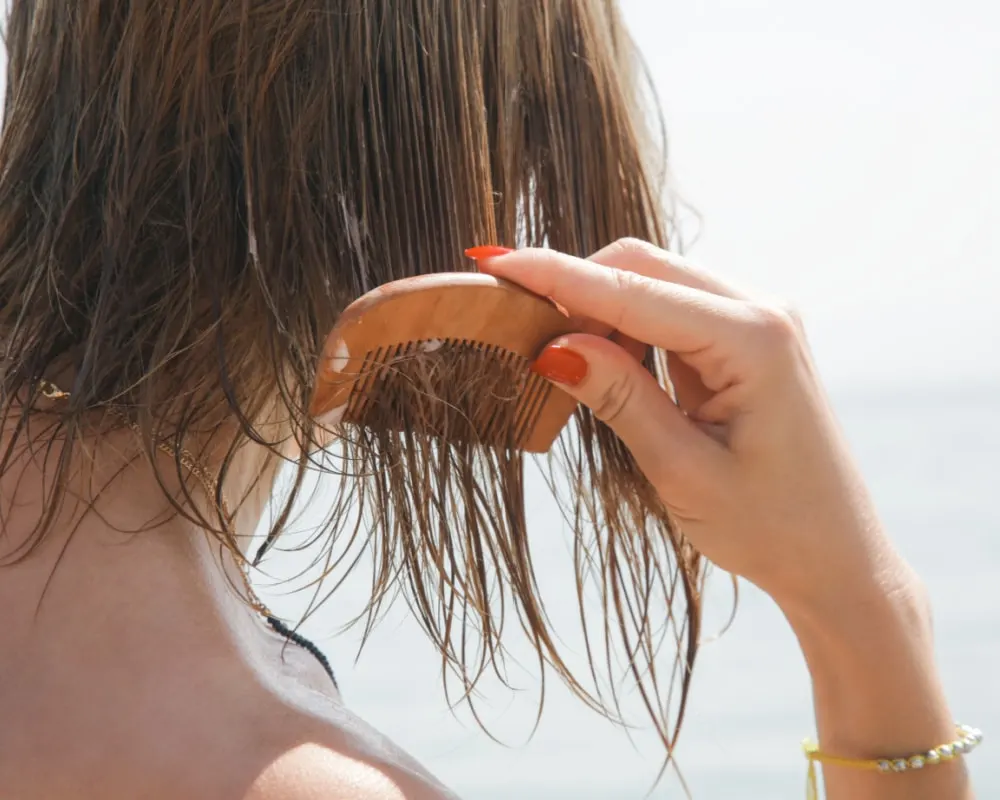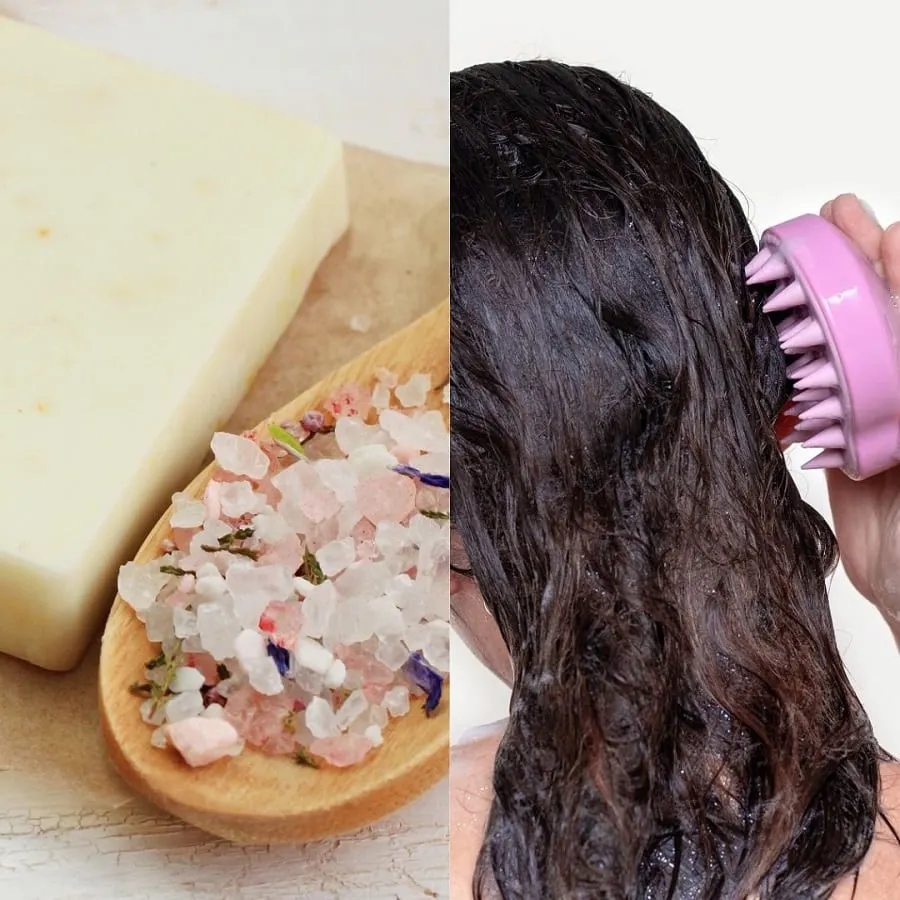A day at the beach swimming in the sea can leave hair with gorgeous waves and volume. But other times, that dip in the ocean leaves hair dry, brittle, and fried. So is sea water good or bad for your hair?
Seawater is a mixture of water and various dissolved salts, primarily sodium chloride. The effects of saltwater on hair are complex.
However, some of the ocean’s minerals may attach to hair fibers, leaving hair smooth and soft.
In this article, we’ll break down the pros and cons of seawater for hair. We’ll provide tips for minimizing damage from salt exposure. And we’ll let you decide if beachy waves are worth the risk of dry, damaged strands.
Benefits of Seawater on Hair

Besides offering an enjoyable swim, ocean water can also provide the following benefits for your hair:
1. Nourishes Your Hair
Rich in magnesium, potassium, and calcium, ocean water helps strengthen your strands and restore their natural shine. It can also protect them from the harmful effects of mercury.
Mercury is a chemical that builds up in your body after consuming a lot of seafood. Too much of it can stimulate your hair to quickly reach the shedding phase.
So it won’t be long before you look like the live-action version of Homer Simpson. However, ocean water can reduce the mercury levels in your hair, preventing premature hair loss.
2. Works as Natural Shampoo
Whether we like it or not, everyone’s hair produces a certain amount of oil. It’s a natural process that occurs to keep your scalp hydrated.
Unfortunately, some people’s glands produce more oil than others, resulting in greasy strands.
That’s where salt water comes in. It acts as a natural shampoo, eliminating excess sebum and regulating oil production in your scalp. It also removes shampoo buildup, leaving your hair smoother and healthier.
3. Treats Your Scalp
Saltwater contains minerals such as magnesium and potassium, which are antioxidants. Antioxidants can help protect the skin from damage caused by free radicals
Ocean’s salt also has antibacterial characteristics, which can treat various scalp diseases like psoriasis and eczema.
4. Protects Against Fungal Infections
Besides its anti-inflammatory and antibacterial properties, ocean water also has anti-fungal characteristics. It’s an excellent treatment for fungus-induced dandruff.
Dandruff forms because of a fungus called Malassezia globosa. It feeds on the excess oil on your scalp and turns it into oleic acid, promoting the growth of dandruff flakes.
However, salt water absorbs excess moisture and oil on your scalp, depriving dandruff of the source that stimulates its growth.
5. Increases Hair Volume

All hair isn’t created equal. Some people have luxurious strands, while others have bland hair. If you’re the latter, ocean water is your new best friend.
Saltwater crystals swell the hair cuticle, adding volume and texture to your strands. So you can finally enjoy that wavy hair you’ve always wanted.
6. Acts as an Efficient Exfoliator
As a natural exfoliator, ocean water can remove dead cells, treat scalp itchiness, and get rid of built-up dirt at the roots.
Additionally, the saltwater crystals increase blood flow to your scalp. So, your hair follicles receive more oxygen and nutrients, which promotes healthy hair growth.
Negative Effects of Seawater on Hair Health

So, ocean water is a perfect natural component that can improve your hair’s health and texture, right? No, it’s not. Despite the various benefits it offers, using ocean water on your hair doesn’t come without risks.
Drying Your Hair
The biggest drawback to applying ocean water is that it can cause your hair to dry out. You see, salt and water have a natural attraction force.
So when you use ocean water on your hair, the salt will absorb all the moisture inside, leaving it dry and brittle. However, that only happens if you leave it on your hair for too long or apply it too frequently.
Damaging Your Hair
If you’ve recently exposed your hair to any type of chemicals, like dyes or bleaches, we don’t recommend applying ocean water to it. That’s because these chemicals usually strip your hair of its moisture content.
Not only will adding ocean water damage your hair, but the excess salt will also cause its color to fade.
Pro tip: You can avoid these issues by applying oil to your hair before exposing it to water. It’ll protect your hair from drying out and strengthen your scalp with its minerals.
How to Prevent Ocean Water Damage?

Sometimes, we can’t control how much salt water our hair gets exposed to. After all, summer calls for long ocean swims, right?
Don’t worry. You can minimize the sea water hair damage with the following procedures:
- Dry hair is more prone to absorbing salt. Rinse your hair with fresh water before swimming in the ocean to reduce salt buildup.
- Apply a leave-in conditioner or a hair oil before swimming to create a protective barrier.
- Wear a swim cap if you’ll be in the water for extended periods.
- Once rinse it with fresh water immediately, then wash it with a hydrating conditioner.
- Limit the use of heat styling tools after swimming to prevent further drying.
- Consider using a hair serum that’s designed to protect against environmental stressors, including saltwater.
- If you swim regularly trim the hair ends regularly to avoid splits.
How to Wash Your Hair with Salt Water at Home?

So we’ve talked about how beneficial ocean water is to your hair. What about people who don’t live near oceans or beaches, though?
Don’t worry. Swimming in the ocean isn’t the only way for your hair to get the benefits of its salt. You can prepare a few mixtures that will give you similar results.
Add 2 tbsp of castile soap to 3 tbsp of sea salt and mix them. Apply the mixture to your hair like you would with a regular shampoo, then rinse it with clean water.
You can also make a sea salt solution by mixing 3 tbs of sea salt and 240 ml of warm water. Once the salt dissolves, apply the mixture to your scalp with a spoon. Massage the affected areas for a few minutes, and you’re done.
Final Verdict
Though there are multiple benefits of Ocean water for hair like nourishing the hair, treating the scalp, or preventing fungal infections, overall it’s not good for your hair.
The excess salt of seawater can dry out and damage your hair if you don’t care for it properly. So make sure to take the necessary precautionary measures when you go swimming.
Trending Topics:
- Is Silicone Bad for Hair?
- Is Clove Water Good For Hair?
- Is Onion Juice Good For Hair?
- Is Fermented Rice Water Good for Hair?
- Benefits of Rinsing Hair With Cold Water
